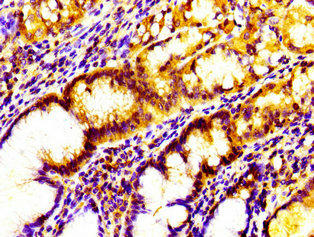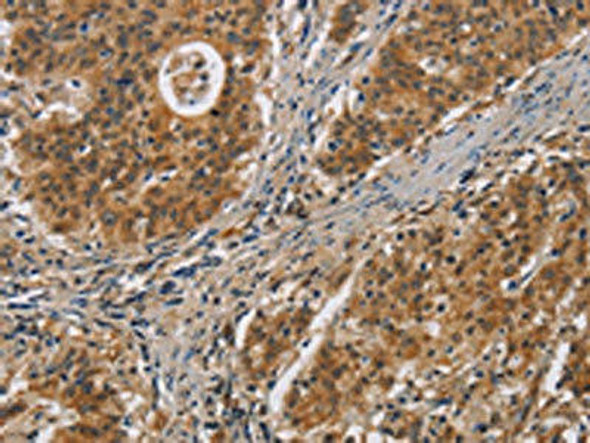Description
IL17D Antibody (PACO55238)
The IL17D Antibody (PACO55238) is a high-quality polyclonal antibody designed for research involving the IL17D protein, a member of the interleukin-17 family known for its role in immune regulation and inflammation. This antibody, raised in rabbits, exhibits high reactivity with human samples and is validated for use in a variety of applications, including Western blotting.IL17D is a cytokine that is involved in the regulation of immune responses, particularly in the context of host defense against pathogens and tissue repair. It plays a crucial role in inflammatory processes and has been implicated in diseases such as autoimmune disorders and cancer.
By targeting IL17D with this antibody, researchers can better understand its function and potential therapeutic applications in immunology and cancer research.With its ability to detect and analyze IL17D in various cell types, the IL17D Antibody (PACO55238) is a valuable tool for studying the complex mechanisms of immune regulation and inflammation. Its specificity and sensitivity make it an ideal choice for researchers seeking to uncover the roles of IL17D in health and disease.
| Antibody Name: | IL17D Antibody (PACO55238) |
| Antibody SKU: | PACO55238 |
| Size: | 50ug |
| Host Species: | Rabbit |
| Tested Applications: | ELISA, IHC |
| Recommended Dilutions: | ELISA:1:2000-1:10000, IHC:1:20-1:200 |
| Species Reactivity: | Human |
| Immunogen: | Recombinant Human Interleukin-17D protein (16-202AA) |
| Form: | Liquid |
| Storage Buffer: | Preservative: 0.03% Proclin 300 Constituents: 50% Glycerol, 0.01M PBS, pH 7.4 |
| Purification Method: | >95%, Protein G purified |
| Clonality: | Polyclonal |
| Isotype: | IgG |
| Conjugate: | Non-conjugated |
 | Immunohistochemistry of paraffin-embedded human gastric cancer using PACO55238 at dilution of 1:100. |
| Background: | Induces expression of IL6, CXCL8/IL8, and CSF2/GM-CSF from endothelial cells. |
| Synonyms: | Interleukin-17D (IL-17D) (Interleukin-27) (IL-27), IL17D |
| UniProt Protein Function: | IL17D: Induces expression of IL-6, IL-8, and GM-CSF from endothelial cells. Belongs to the IL-17 family. |
| UniProt Protein Details: | Protein type:Secreted, signal peptide; Secreted; Cytokine Chromosomal Location of Human Ortholog: 13q11 Cellular Component: extracellular space Molecular Function:cytokine activity; hematopoietin/interferon-class (D200-domain) cytokine receptor binding Biological Process: cell surface receptor linked signal transduction; inflammatory response |
| NCBI Summary: | The protein encoded by this gene is a cytokine that shares the sequence similarity with IL17. The treatment of endothelial cells with this cytokine has been shown to stimulate the production of other cytokines including IL6, IL8 and CSF2/ GM-CSF. The increased expression of IL8 induced by this cytokine was found to be NF-kappa B-dependent. [provided by RefSeq, Jul 2008] |
| UniProt Code: | Q8TAD2 |
| NCBI GenInfo Identifier: | 46576614 |
| NCBI Gene ID: | 53342 |
| NCBI Accession: | Q8TAD2.1 |
| UniProt Secondary Accession: | Q8TAD2,B1AM69, |
| UniProt Related Accession: | Q8TAD2 |
| Molecular Weight: | 21,893 Da |
| NCBI Full Name: | Interleukin-17D |
| NCBI Synonym Full Names: | interleukin 17D |
| NCBI Official Symbol: | IL17D |
| NCBI Official Synonym Symbols: | IL-17D |
| NCBI Protein Information: | interleukin-17D |
| UniProt Protein Name: | Interleukin-17D |
| UniProt Synonym Protein Names: | Interleukin-27 |
| Protein Family: | Interleukin |
| UniProt Gene Name: | IL17D |
| UniProt Entry Name: | IL17D_HUMAN |
| Antibodies | ELISA Kits |
| IL17D Antibody (PACO07421) | Human IL-17D ELISA Kit |
| Human Interleukin-17D (IL-17D) ELISA Kit |
| Secondary Antibody |
| Anti-HRP Goat Anti-Rabbit IgG (H+L) Antibody (CABS014) |
| Recommended Products |
| Anti-FITC Goat Anti-Rabbit IgG (H+L) Antibody (CABS011) |
| Anti-HRP-conjugated Beta Actin Antibody (CABC028) |












